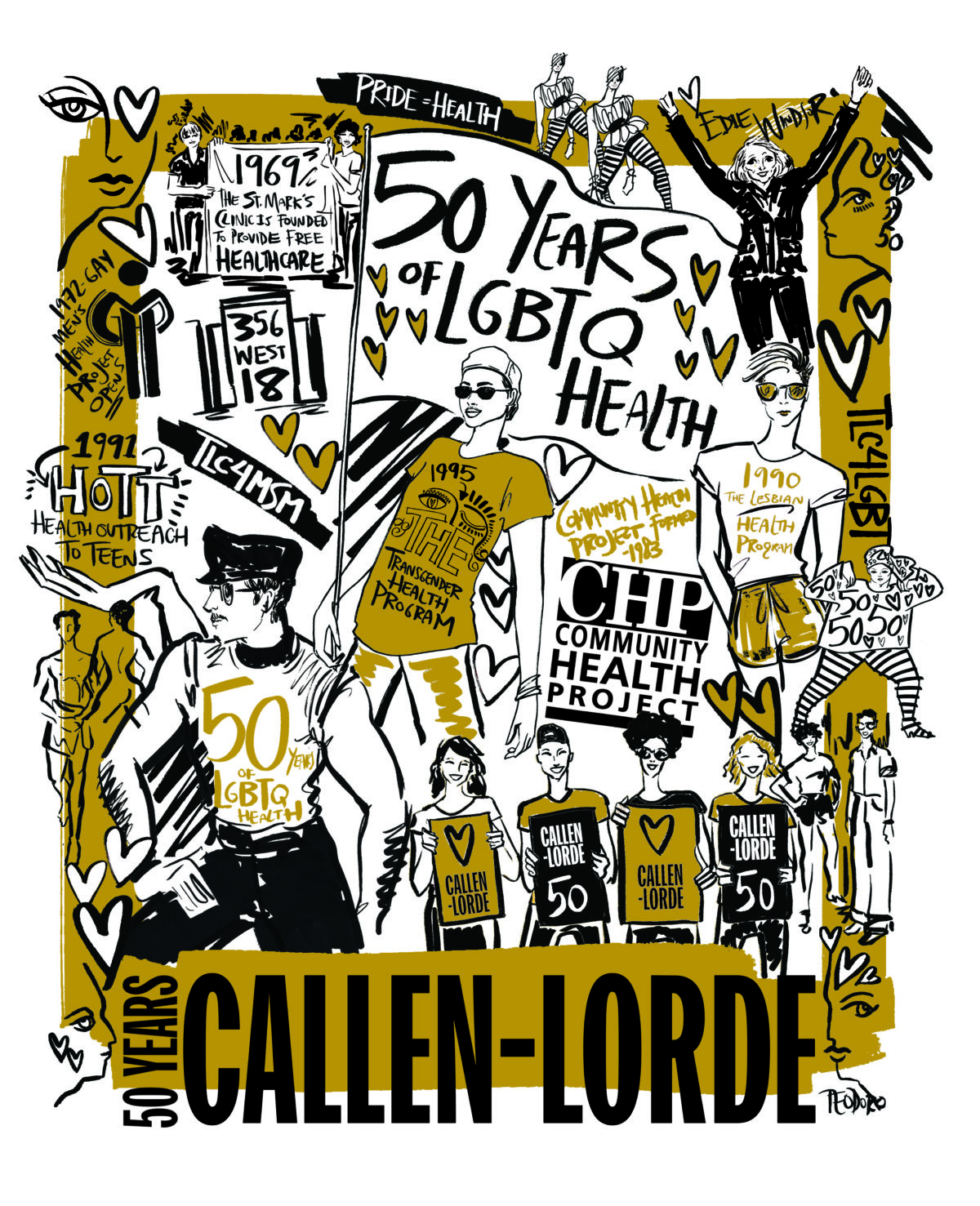Celebrating Our History: 50 Years of LGBTQ Health

In many ways, the history of Callen-Lorde mirrors the communities of those we serve: a story of grit, determination, and resilience.
In 1969, just shy of 6 months after Stonewall, two young doctors started the St. Mark’s Clinic (also known as ‘St. Mark’s Free Clinic’ and ‘St. Mark’s Community Clinic) at 44 St. Marks Place, the epicenter of East Coast counter culture. The mission of the clinic was to provide free health care to young people and people in the neighborhood, who, according to a volunteer at the time, consisted largely of ‘hippies,’ ‘freaks,’ and ‘queers.’ The majority of the patients were between 16-25 years of age, and came in droves for STI testing & treatment, illness related to substance use, reproductive health, and mental health counseling.
The concept of this type of healthcare – the notion of healthcare as a human right, one to be provided without judgment, and without pay – was radical. While much else has changed, our ethos remains the same today.
In the early 1970’s, a group of seven queer women banded together to create the Women’s Health Collective – the “Oldest Lesbian Clinic in the Nation” at St. Marks. In the later 1970’s, the Women’s Collective expanded and took over St. Marks, building their own location on 2nd Avenue and 2nd Street. Their vision was to break down the barrier between provider and patient. They were anti-establishment, anti-racist, and rooted in health justice.
Meanwhile, in 1972, a group of three friends – Leonard Ebreo, Marc Rabinowitz, and Perry Brass – founded the Gay Men’s Health Project (GMHP). None had a background in health care, but they wanted to reduce shame, fear, and stigma about gay bodies and gay sex to improve health outcomes among themselves and their peers.
GMHP opened in an unfinished concrete basement at 247 West Eleventh Street in Greenwich Village. They held forums with various speakers on venereal diseases (sexually transmitted infections, or STIs) and advocated using condoms, which were only previously associated with birth control. They taught themselves how to swab, screen and diagnose STI’s, and would refer patients who tested positive to licensed clinics. Many were referred to St. Marks, which would eventually lead to a more codified relationship between the two.
Both the Women’s Health Collective and Gay Men’s Health Project pioneered the idea that healthcare could not only be inclusive of queer people, but provided by queer people.
In 1983, to pool resources in response to the growing AIDS epidemic, the St. Mark’s Clinic merged with Gay Men’s Health Project to create Community Health Project, Inc. (CHP). CHP took up space (squatted) at 208 West 13th Street in Greenwich Village – a building which would later become “The Lesbian, Gay, Bisexual and Transgender Community Center.”
The 1980’s were a devastating time, and CHP was seeing patients suffering from HIV-related illness in droves. In 1985, with funding from the Robert Wood Johnson Foundation, CHP opened the nation’s first community-based HIV clinic in conjunction with Bellevue Hospital. CHP not only treated patients with AIDS and AIDS-related complications, but created the “AIDS Assessment Program” – an innovative, first of its kind program to assess risk and help prevent transmission of HIV/AIDS.
In the early 90’s, community-specific programs like the Lesbian Health Program (LHF), The Transgender Health & Education Program (THE) and Health Outreach to Teens (HOTT) Program created community and a pathway to care for groups who experienced further marginalization. Ultimately, these initiatives helped build the foundation of Callen-Lorde’s care model: integrative, community-centric, and provided regardless of ability to pay.
In addition to testing, diagnosing, and treating illness, CHP had a goal to more proactively keep our communities healthy through primary care. However, the space in the Center was not code compliant with the State Department of Health. A primary care center required additional licensing, technology and space, and so, the decision was made to move once again and expand operations. In 1996, with help from New York State, CHP purchased a 27,000 square foot abandoned building at 356 West 18th St and began a gut renovation. In 1998, under a new State Department of Health license, CHP became the “Michael Callen -Audre Lorde Community Health Center,” dedicated to singer, songwriter, and AIDS activist Michael Callen and self-described “Black, lesbian, mother, warrior, poet,” Audre Lorde.
Since then, we have continued to expand to meet the growing needs of our communities. We opened a dental clinic and care coordination program, and an on site pharmacy. We added public policy & advocacy, research, and education – working to improve the health of LGBTQ people outside our doors and around the globe. In 2014, we opened the Thea Spyer Center (also known as 17th Street) at 230 West 17th Street – a dedicated space for behavioral and sexual health. In 2016, we opened our first space outside of Manhattan – Callen Lorde Bronx. And now, in 2019 – 50 years since our grassroots beginnings – we are expanding yet again, building towards our fourth location in downtown Brooklyn.
We’ve come a long way. There have been insurmountable challenges and incredible opportunities. We have not only risen to the occasion, but, like our communities, have risen above. We look forward to a future built on the foundation of those who fought so we might love, and lived so we might thrive. Our future is only possible because of the foundation built upon those who came before. Thank you for sharing with us in this journey.